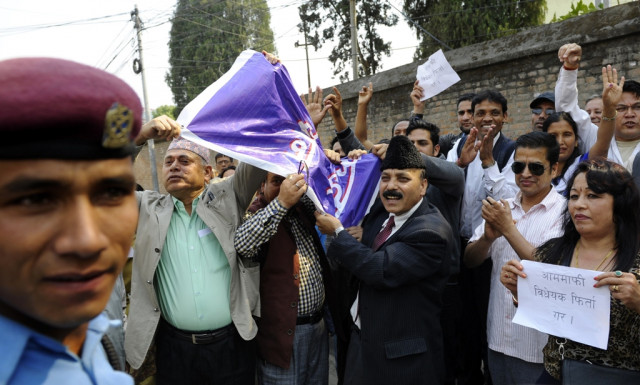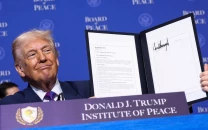Nepal bill offers amnesty for war crimes
Those accused of rape will not be granted amnesty.

Nepalese victims of war and human rights activists chant anti-goverment slogans during a protest in front of government offices in Kathmandu. PHOTO: AFP
The government late Wednesday introduced a bill in parliament to set up a Truth and Reconciliation Commission and a Commission on the Disappeared, aimed at healing wounds from the decade-long conflict.
Those found guilty of serious crimes during hearings by the commissions could receive a pardon except for cases of rape, said Ramesh Lekhak, a member of the ruling Nepali Congress party who drafted the bill.
"No amnesty will be granted to those accused of rape," Lekhak said.
"The commissions will investigate (other) cases and recommend whether they qualify for amnesty," he told AFP, adding that any offer of amnesty would still need the victim's approval.
"Our focus is on reconciliation. But the victim's consent will be mandatory to pardon the accused," he added.
The conflict between Maoist guerrillas and the state ended in 2006, leaving more than 16,000 dead. Rebels, soldiers and police were accused of serious human rights violations including killings, rapes, torture and disappearances.
The Maoists and the government agreed to set up commissions focused on peace and reconciliation when they signed a peace deal.
The bill comes after intense lobbying by Maoist lawmakers to reject a recommendation from a government-appointed panel, that no amnesty be offered to anyone who committed serious abuses during the war.
Parliament is set to debate it next week.
An earlier Maoist-led government in 2013 passed legislation that sought to grant amnesty to those responsible for major human rights violations. But the Supreme Court rejected the provisions in a ruling last January.
Although the court has issued arrest warrants over several cases of rights abuses during the war, there have been no prosecutions so far.



















COMMENTS
Comments are moderated and generally will be posted if they are on-topic and not abusive.
For more information, please see our Comments FAQ